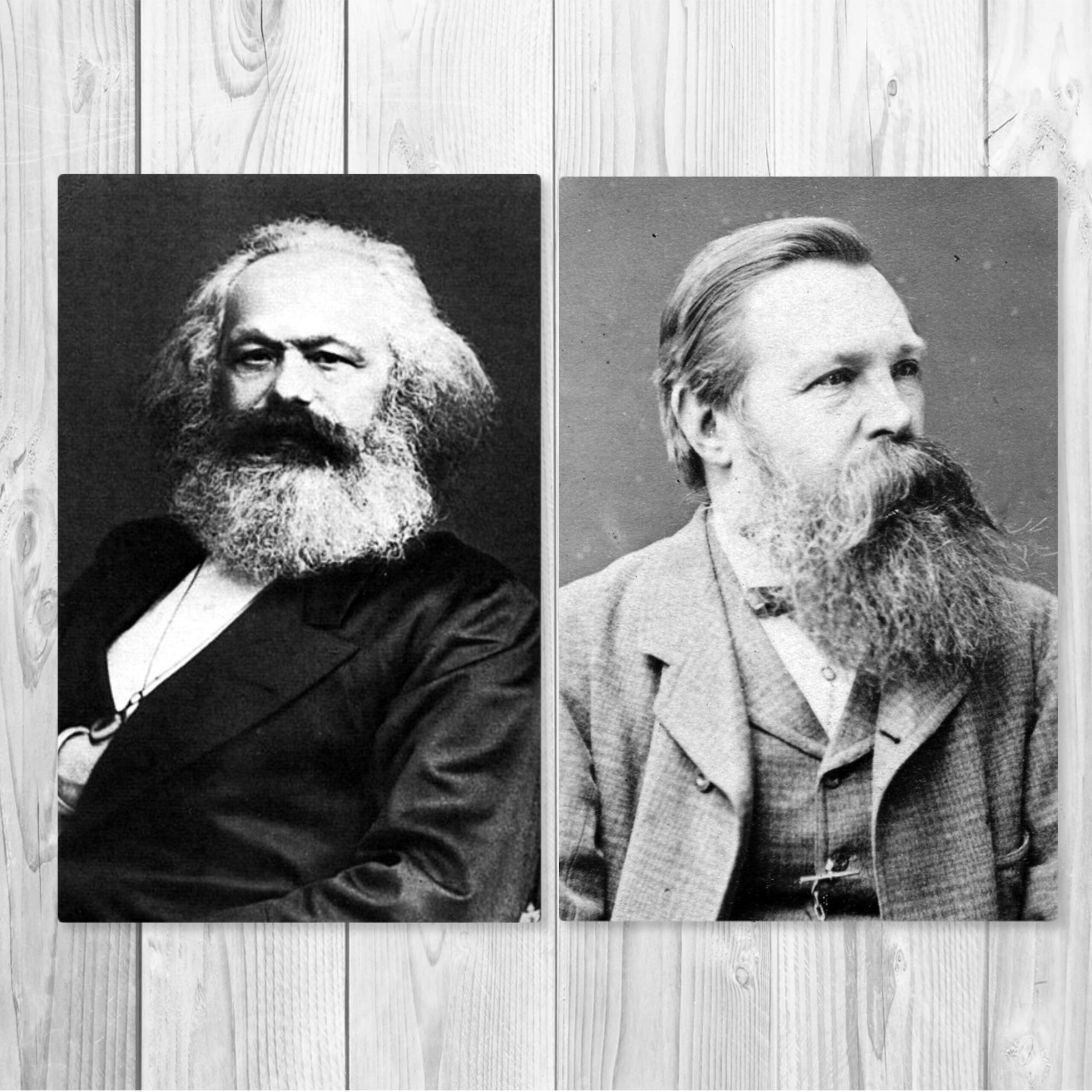Table of Contents
マルクス『聖家族』概要と感想~青年ヘーゲル派、ブルーノバウアーとの決別。エンゲルスとの最初の共同作業「マルクス・エンゲルスの生涯と思想背景に学ぶ」(28)
In the above article, we have provided a brief chronological overview of the lives of Marx and Engels, but in this series, "Learning from the Life and Thought Background of Marx and Engels," we will look at the lives and thought of Marx and Engels in more detail.
I will now refer to the book by Tristram Hunt.'TheEngels, The Man Marx Called General."This is a biography of Engels called.
What makes this book excellent is that it explains in an easy-to-understand manner which ideas influenced Engels and how his writings were produced from them.
It is very easy to understand the flow of history because you can learn along with the historical background of the time and the ideas that were popular at the time. It is easy to understand how the ideas of Engels and Marx were developed. The book also gives me a road map of what to read next to learn more about Marx and Engels. I appreciated this.
And this book made me realize how much Engels had influenced Marx's writings. It is quite amazing.
Although this book is a biography of Engels, it also goes into great detail about Marx. It was such a great biography that I thought I could learn more about Marx by reading this book than by reading a biography or commentary on Marx.
We may use other Marx biographies to supplement some of Marx's life and interesting episodes, but basically we will focus on this book and take a closer look at the lives of Marx and Engels.
For other reference books, see the following articles"List of 12 recommended Marx biographies--to learn more about the life and thought of Marx Engels."Please refer to this page for a summary.
So let's get started.
マルクス・エンゲルスの初めての共同作業
彼らの関係が生みだした最初の成果は、『批判的批判の批判、ブルーノ・バウアーとその仲間への反駁』(一八四五年)であった。この小編は、マンチェスターとパリでの経験ののちに、青年へーゲル派の理想主義の残存者にたいし、二人が共通に感じていた苛立ちを表わしたもので、マルクスとエンゲルスが新たに奉じるようになった唯物論の公的宣言の役目もはたしていた。
「天から地上へ降りてくるドイツの哲学とは好対照に、これは地上から天に昇る問題なのだ」と、彼らはこの哲学的断絶をのちに明確に表現している。「それはつまり、生身の人間に到達するために、人が言ったり、想像したり、考えたりすることから始めるのではなく……現実に活動する人間から始め、生活過程のイデオロギー的反映や反響の展開を明らかにする実際の生活過程にもとづくものである」
この新しい考え方に沿って、マルクスとエンゲルスはこのころには観念論的な哲学思索を「常套句、常套句ばかりだ」と切り捨て、バウアー兄弟のべルリン一派を段階的な社会変革にたいする身勝手な障害物として糾弾した。
「彼らドイツの哲学者にたいする闘いが宣言された。自分たちの単なる理論から、実際的な推論を引きだすのを拒み、人間には形而上学的な問題について思索する以外にすべきことはないとして満足している連中である」と、エンゲルスはのちにますます過激な論調でこの件に触れている。
「ビール知識人」とは袂を分かち、マルクスとエンゲルスはへーゲルのイデーとspiritの影などを追うのではなく、社会・経済の状況に関心を注ぎたいと考えた。「ドイツでは、真の人間中心主義にとって、〈自己意識〉や〈精神〉を現実の個々の人間の代わりにする、精神主義や思弁的な理想主義ほど危険な敵はない」と、彼らは宣言した。
政治経済に関するマルクスの読書と、マンチェスターの綿工場で過ごしたエンゲルスの経験から、近代社会を形成するうえで私的所有がはたした決定的役割は二人には明らかになっていた。
社会構造を決定するのは、「色あせ、主人を失ったへーゲル哲学」ではなく物質的現実なのであり、証拠が必要ならば、過去を振り返りさえすれば事足りるのであつた。歴史の唯物論的解釈を試験的に試みた初期の取り組みのなかで、エンゲルスは現実に血の通った人間による貢献を強調することによって、イデーが歴史のなかで役割をはたしたとするへーゲルに反論した。
「歴史は何もせず、莫大な富ももたず、どんな戦いも仕掛けない」と、彼はブルーノ・バウアーへの批判に書いた。「財産を所有し、行動を起こし、戦争をするのは、〈歴史〉ではなく、生身の人間なのだ。己の目的を達成するために人間を利用する、〈歴史〉と呼ばれる独立した存在などない。歴史は単に、目的をもった人間の活動に過ぎない」
Chikuma Shobo, Tristram Hunt, translated by Erika Togo, Engels: The Man Called General by Marx, p. 159-160
Some line breaks have been made.
この箇所で述べられるように、マルクスとエンゲルスはかつての仲間であったビール知識人たちと完全に袂を分かつことになりました。
ついにマルクスとエンゲルスは彼らから離れ、独自な道を歩んでいくことになるのです。
ブルーノ・バウアーやビール知識人たちについては以下の記事をご参照ください。
『聖家族』とエンゲルスを悩ますマルクスの弱点「遅筆」
Despite its pompous theme, "Critical Criticism" was originally intended as a short satire on Bauer and others, and Engels quickly compiled it into a manuscript for his own use before leaving Paris for Barmen in September of 1844.
'Farewell, dear Karl,' Engels wrote in parting. I have not been able to recapture the good cheer and motivation I experienced during the ten days I spent with you."
He foolishly left the manuscript with dear Karl, where it was instantly rewritten in an unrestrained style recognizable as Marx's. First and foremost, the length was changed. I was more than a little surprised by the fact that you had expanded "Critical Criticism" to nineteen pages. ...... It would seem strange if you left my name in the title. I wrote only one and a half pages," Engels wrote.
In addition, a disproportionate amount of pages were devoted to denouncing political opponents. The exceptional disdain we both feel for the "Literary Gazette" contrasts sharply with the pages devoted to it.
The increased number of pages in this booklet also foreshadowed early on a serious weakness in Marx, who was often distracted from more substantive projects. Please let me finish your book on political economy," he said. Even if you yourself are still unconvinced on many points, it doesn't really matter. My head is ripe, and the iron must be struck while it is hot," Engels pleaded in a familiar phrase that would be repeated with disgust over the next few decades.
Do as I do. By thenIt'll never end.I set myself a deadline of "I'm going to make sure it goes to print right away," he said.
Finally, there was the journalist's unique knack for giving a title that would be well received. In a derisive reference to the Bauer school, Marx renamed the pamphlet "The Holy Family, or A Critique of Critical Criticism, a Refutation of Bruno Bauer and His Friends. The new title will probably put me in a tight spot with my ...... otherwise very angry and pious parents. You couldn't have known that."
Chikuma Shobo, Tristram Hunt, translated by Erika Togo, Engels: The Man Called General by Marx, p. 160-161
Some line breaks have been made.
「どうか君の政治経済の本を終わらせるようにしてくれ。たとえ君自身はまだ納得のいかない点が多々あったとしても、そんなことは実際どうでもよいのだ。頭のなかは熟しており、鉄は熱いうちに打たねばならない」
Do as I do. By thenIt'll never end.という期限を自分で設定し、確実にすぐさま印刷にかけられるようにするんだ」
堅実な実務家でもあったエンゲルスの狼狽っぷりが目に見えるようですよね。
実際、マルクスはこの後の『共産党宣言』も『資本論』第一巻でも、締め切りに間に合わず、完成まで延びに延びてようやく出版までたどり着くというパターンを繰り返します。
その度にエンゲルスは現代の編集者さながらに催促をしていたのでしょう。
And one more point.
「政敵への非難のために不釣合いなほどのぺージが割かれていた。「『文学新聞』にたいしてわれわれ二人がいだく格別な軽蔑の念は、そのために費やしたぺージと好対照をなしている」。
この小冊子のぺージ数の増加はより実質的なプロジェクトから気をそらされがちなマルクスの深刻な弱点も早くから予感させていた。」
マルクスは自身の説を論証すべきところでも他者の批判でかなりの分量を使ってしまうという癖がこの段階でも現れていたようです。
ただ、マルクスは「他者への容赦ない攻撃」があまりにも強烈で巧みなため、これがあるからこそマルクスの人気が高まったという側面もあったのではないかと思われます。
明確な論理よりも、派手な攻撃で他者をこき下ろし、読者、聴衆を圧倒するという手法は後のレーニンも用いたものです。
参考までにこちらもご覧ください。
Next Article.
Click here to read the previous article.
Related Articles







































